Nursing Leadership and Philosophy: A Personal Reflection Essay
VerifiedAdded on 2022/10/02
|5
|898
|95
Essay
AI Summary
This essay provides a reflection on the student's personal leadership philosophy within the context of the nursing profession. The author defines leadership as guiding individuals toward common goals, emphasizing its importance for quality patient care and safety. The essay differentiates between formal and informal leadership, providing examples of both and highlighting the roles each plays in a healthcare setting. The author reflects on personal experiences, including an instance of informal leadership in grade 12, and discusses how interactions with professional bodies like the Registered Nurses Association of Ontario (RNAO) have shaped their leadership perspective. The essay stresses the impact of effective leadership on organizational success and the importance of nurses as knowledge-based professionals, concluding that the success of healthcare organizations hinges on the nature of their leadership.
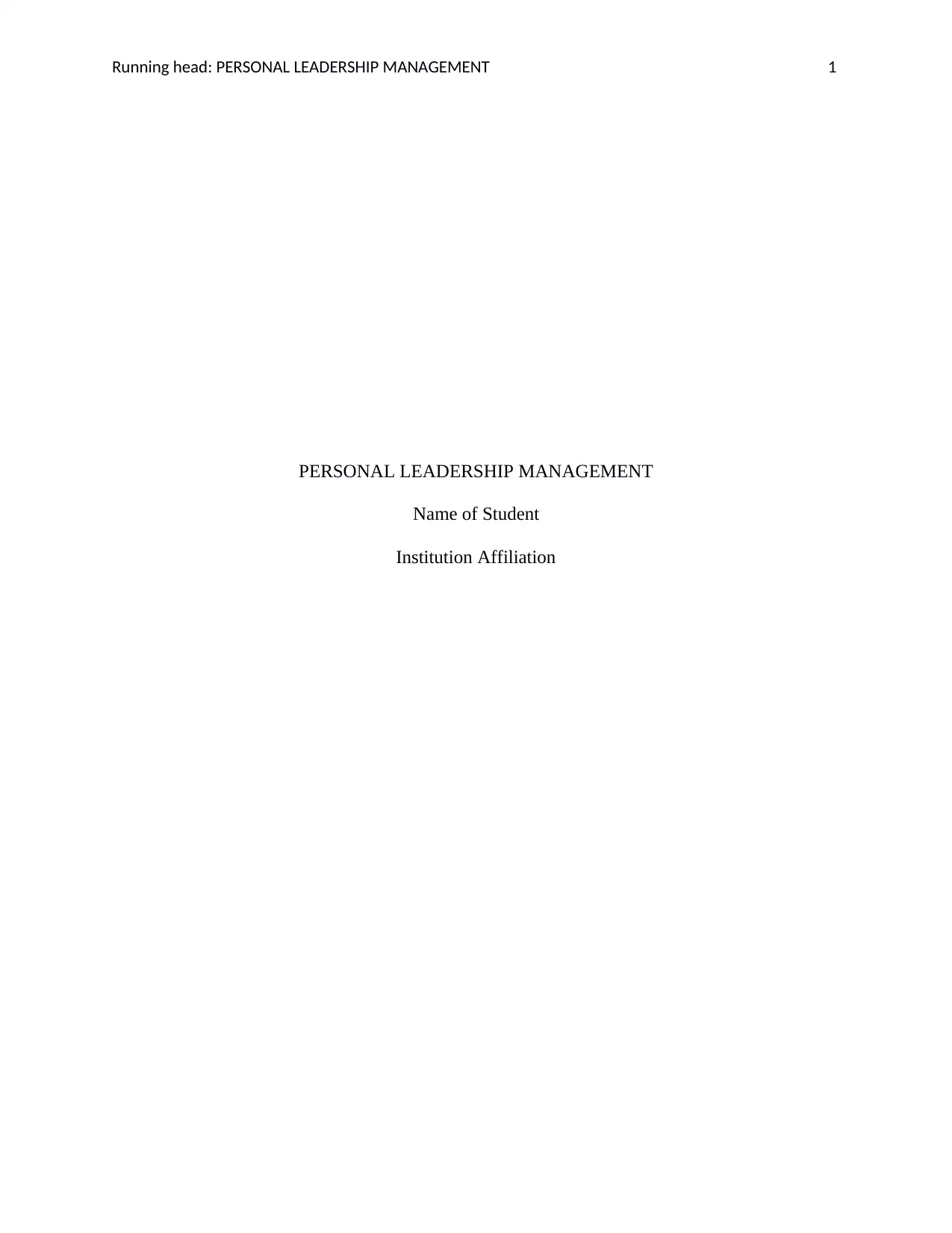
Running head: PERSONAL LEADERSHIP MANAGEMENT 1
PERSONAL LEADERSHIP MANAGEMENT
Name of Student
Institution Affiliation
PERSONAL LEADERSHIP MANAGEMENT
Name of Student
Institution Affiliation
Paraphrase This Document
Need a fresh take? Get an instant paraphrase of this document with our AI Paraphraser
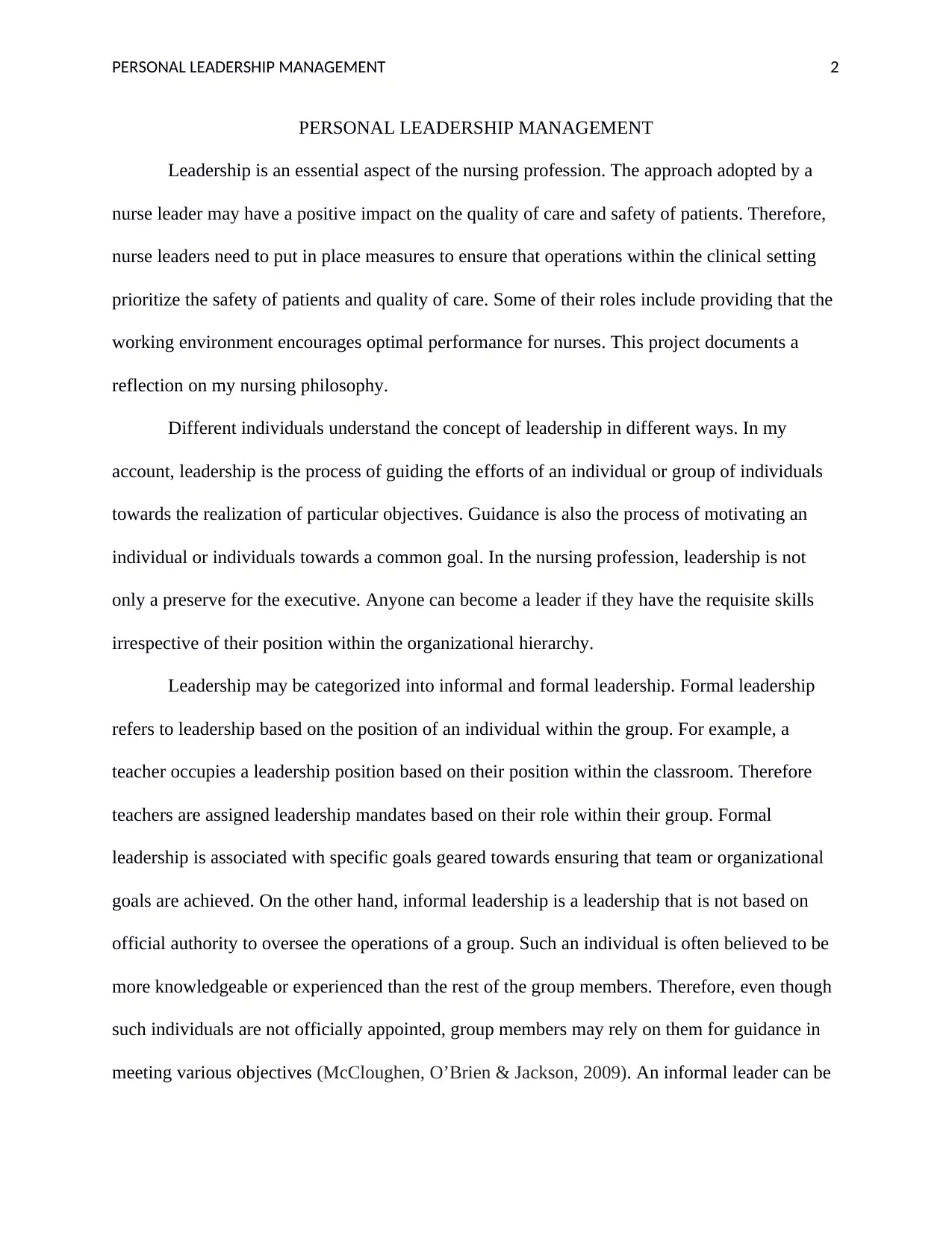
PERSONAL LEADERSHIP MANAGEMENT 2
PERSONAL LEADERSHIP MANAGEMENT
Leadership is an essential aspect of the nursing profession. The approach adopted by a
nurse leader may have a positive impact on the quality of care and safety of patients. Therefore,
nurse leaders need to put in place measures to ensure that operations within the clinical setting
prioritize the safety of patients and quality of care. Some of their roles include providing that the
working environment encourages optimal performance for nurses. This project documents a
reflection on my nursing philosophy.
Different individuals understand the concept of leadership in different ways. In my
account, leadership is the process of guiding the efforts of an individual or group of individuals
towards the realization of particular objectives. Guidance is also the process of motivating an
individual or individuals towards a common goal. In the nursing profession, leadership is not
only a preserve for the executive. Anyone can become a leader if they have the requisite skills
irrespective of their position within the organizational hierarchy.
Leadership may be categorized into informal and formal leadership. Formal leadership
refers to leadership based on the position of an individual within the group. For example, a
teacher occupies a leadership position based on their position within the classroom. Therefore
teachers are assigned leadership mandates based on their role within their group. Formal
leadership is associated with specific goals geared towards ensuring that team or organizational
goals are achieved. On the other hand, informal leadership is a leadership that is not based on
official authority to oversee the operations of a group. Such an individual is often believed to be
more knowledgeable or experienced than the rest of the group members. Therefore, even though
such individuals are not officially appointed, group members may rely on them for guidance in
meeting various objectives (McCloughen, O’Brien & Jackson, 2009). An informal leader can be
PERSONAL LEADERSHIP MANAGEMENT
Leadership is an essential aspect of the nursing profession. The approach adopted by a
nurse leader may have a positive impact on the quality of care and safety of patients. Therefore,
nurse leaders need to put in place measures to ensure that operations within the clinical setting
prioritize the safety of patients and quality of care. Some of their roles include providing that the
working environment encourages optimal performance for nurses. This project documents a
reflection on my nursing philosophy.
Different individuals understand the concept of leadership in different ways. In my
account, leadership is the process of guiding the efforts of an individual or group of individuals
towards the realization of particular objectives. Guidance is also the process of motivating an
individual or individuals towards a common goal. In the nursing profession, leadership is not
only a preserve for the executive. Anyone can become a leader if they have the requisite skills
irrespective of their position within the organizational hierarchy.
Leadership may be categorized into informal and formal leadership. Formal leadership
refers to leadership based on the position of an individual within the group. For example, a
teacher occupies a leadership position based on their position within the classroom. Therefore
teachers are assigned leadership mandates based on their role within their group. Formal
leadership is associated with specific goals geared towards ensuring that team or organizational
goals are achieved. On the other hand, informal leadership is a leadership that is not based on
official authority to oversee the operations of a group. Such an individual is often believed to be
more knowledgeable or experienced than the rest of the group members. Therefore, even though
such individuals are not officially appointed, group members may rely on them for guidance in
meeting various objectives (McCloughen, O’Brien & Jackson, 2009). An informal leader can be
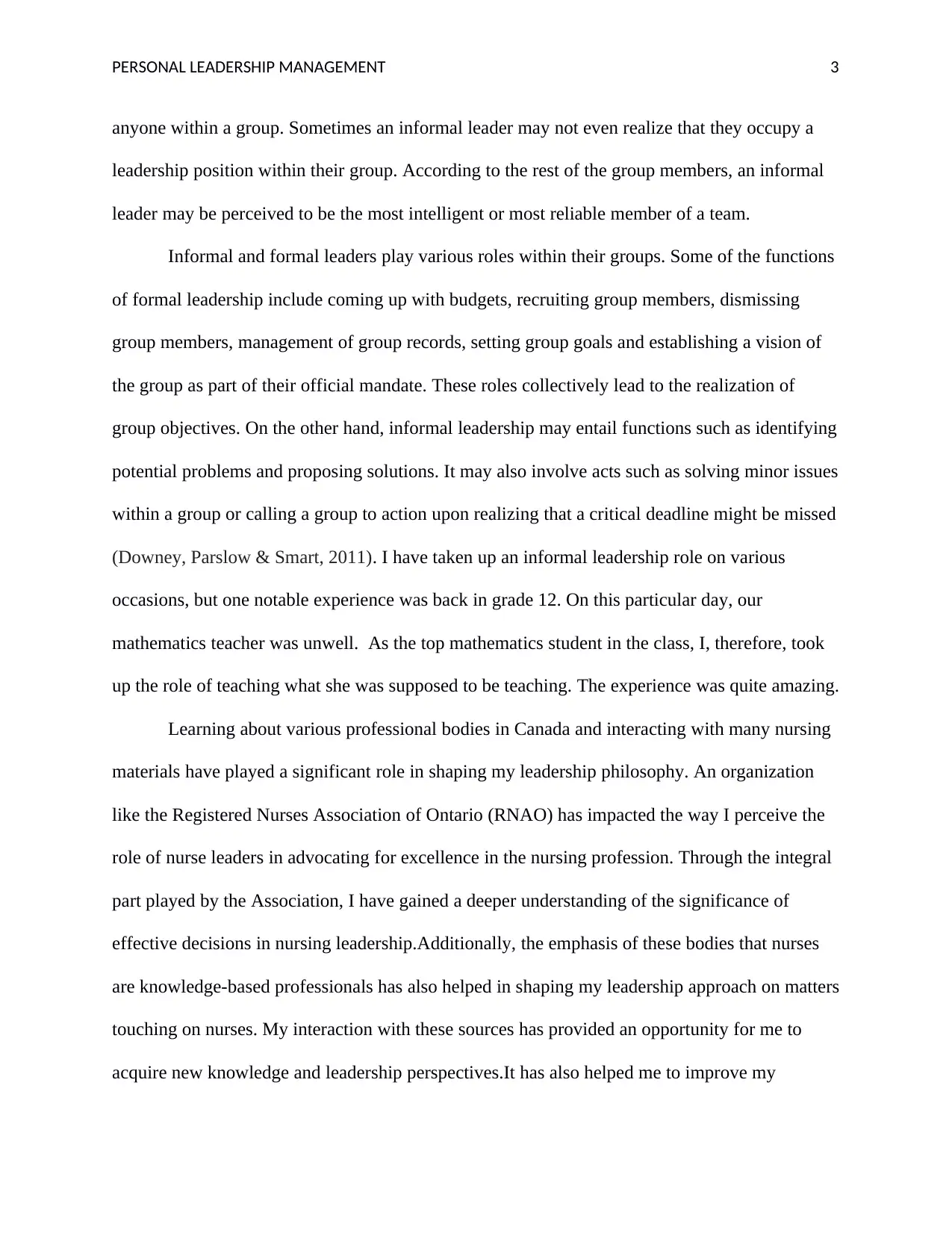
PERSONAL LEADERSHIP MANAGEMENT 3
anyone within a group. Sometimes an informal leader may not even realize that they occupy a
leadership position within their group. According to the rest of the group members, an informal
leader may be perceived to be the most intelligent or most reliable member of a team.
Informal and formal leaders play various roles within their groups. Some of the functions
of formal leadership include coming up with budgets, recruiting group members, dismissing
group members, management of group records, setting group goals and establishing a vision of
the group as part of their official mandate. These roles collectively lead to the realization of
group objectives. On the other hand, informal leadership may entail functions such as identifying
potential problems and proposing solutions. It may also involve acts such as solving minor issues
within a group or calling a group to action upon realizing that a critical deadline might be missed
(Downey, Parslow & Smart, 2011). I have taken up an informal leadership role on various
occasions, but one notable experience was back in grade 12. On this particular day, our
mathematics teacher was unwell. As the top mathematics student in the class, I, therefore, took
up the role of teaching what she was supposed to be teaching. The experience was quite amazing.
Learning about various professional bodies in Canada and interacting with many nursing
materials have played a significant role in shaping my leadership philosophy. An organization
like the Registered Nurses Association of Ontario (RNAO) has impacted the way I perceive the
role of nurse leaders in advocating for excellence in the nursing profession. Through the integral
part played by the Association, I have gained a deeper understanding of the significance of
effective decisions in nursing leadership.Additionally, the emphasis of these bodies that nurses
are knowledge-based professionals has also helped in shaping my leadership approach on matters
touching on nurses. My interaction with these sources has provided an opportunity for me to
acquire new knowledge and leadership perspectives.It has also helped me to improve my
anyone within a group. Sometimes an informal leader may not even realize that they occupy a
leadership position within their group. According to the rest of the group members, an informal
leader may be perceived to be the most intelligent or most reliable member of a team.
Informal and formal leaders play various roles within their groups. Some of the functions
of formal leadership include coming up with budgets, recruiting group members, dismissing
group members, management of group records, setting group goals and establishing a vision of
the group as part of their official mandate. These roles collectively lead to the realization of
group objectives. On the other hand, informal leadership may entail functions such as identifying
potential problems and proposing solutions. It may also involve acts such as solving minor issues
within a group or calling a group to action upon realizing that a critical deadline might be missed
(Downey, Parslow & Smart, 2011). I have taken up an informal leadership role on various
occasions, but one notable experience was back in grade 12. On this particular day, our
mathematics teacher was unwell. As the top mathematics student in the class, I, therefore, took
up the role of teaching what she was supposed to be teaching. The experience was quite amazing.
Learning about various professional bodies in Canada and interacting with many nursing
materials have played a significant role in shaping my leadership philosophy. An organization
like the Registered Nurses Association of Ontario (RNAO) has impacted the way I perceive the
role of nurse leaders in advocating for excellence in the nursing profession. Through the integral
part played by the Association, I have gained a deeper understanding of the significance of
effective decisions in nursing leadership.Additionally, the emphasis of these bodies that nurses
are knowledge-based professionals has also helped in shaping my leadership approach on matters
touching on nurses. My interaction with these sources has provided an opportunity for me to
acquire new knowledge and leadership perspectives.It has also helped me to improve my
⊘ This is a preview!⊘
Do you want full access?
Subscribe today to unlock all pages.

Trusted by 1+ million students worldwide
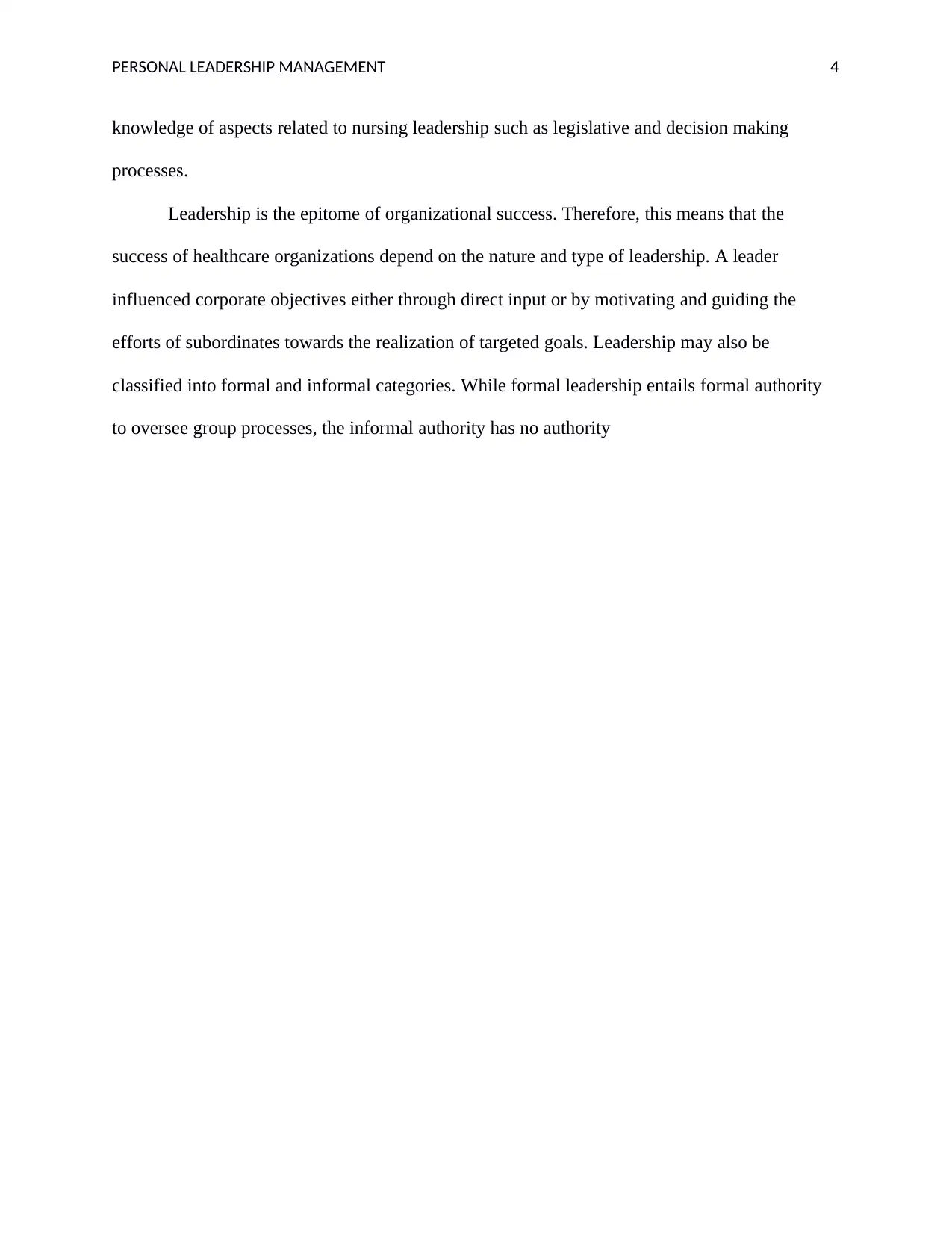
PERSONAL LEADERSHIP MANAGEMENT 4
knowledge of aspects related to nursing leadership such as legislative and decision making
processes.
Leadership is the epitome of organizational success. Therefore, this means that the
success of healthcare organizations depend on the nature and type of leadership. A leader
influenced corporate objectives either through direct input or by motivating and guiding the
efforts of subordinates towards the realization of targeted goals. Leadership may also be
classified into formal and informal categories. While formal leadership entails formal authority
to oversee group processes, the informal authority has no authority
knowledge of aspects related to nursing leadership such as legislative and decision making
processes.
Leadership is the epitome of organizational success. Therefore, this means that the
success of healthcare organizations depend on the nature and type of leadership. A leader
influenced corporate objectives either through direct input or by motivating and guiding the
efforts of subordinates towards the realization of targeted goals. Leadership may also be
classified into formal and informal categories. While formal leadership entails formal authority
to oversee group processes, the informal authority has no authority
Paraphrase This Document
Need a fresh take? Get an instant paraphrase of this document with our AI Paraphraser
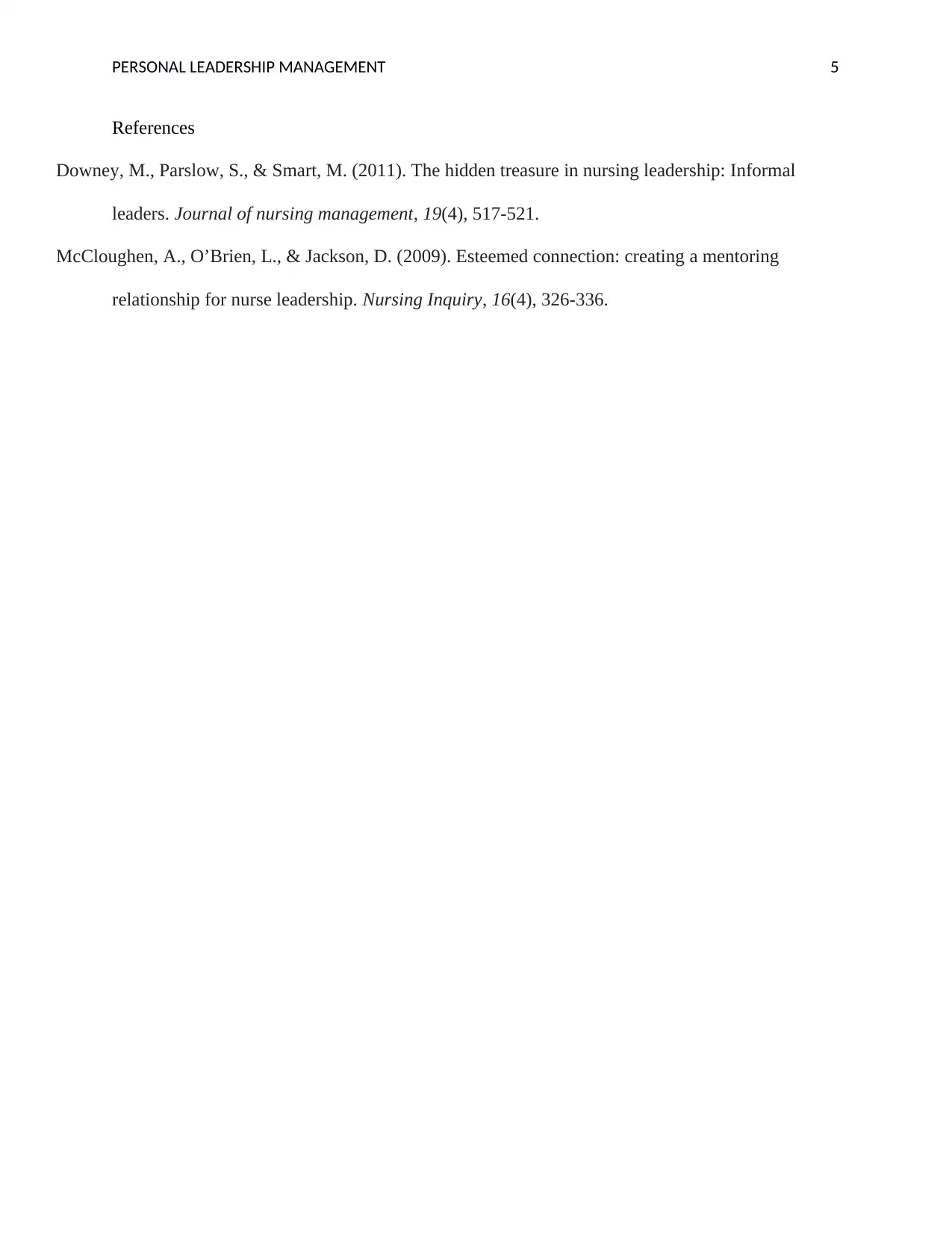
PERSONAL LEADERSHIP MANAGEMENT 5
References
Downey, M., Parslow, S., & Smart, M. (2011). The hidden treasure in nursing leadership: Informal
leaders. Journal of nursing management, 19(4), 517-521.
McCloughen, A., O’Brien, L., & Jackson, D. (2009). Esteemed connection: creating a mentoring
relationship for nurse leadership. Nursing Inquiry, 16(4), 326-336.
References
Downey, M., Parslow, S., & Smart, M. (2011). The hidden treasure in nursing leadership: Informal
leaders. Journal of nursing management, 19(4), 517-521.
McCloughen, A., O’Brien, L., & Jackson, D. (2009). Esteemed connection: creating a mentoring
relationship for nurse leadership. Nursing Inquiry, 16(4), 326-336.
1 out of 5
Related Documents
Your All-in-One AI-Powered Toolkit for Academic Success.
+13062052269
info@desklib.com
Available 24*7 on WhatsApp / Email
![[object Object]](/_next/static/media/star-bottom.7253800d.svg)
Unlock your academic potential
Copyright © 2020–2025 A2Z Services. All Rights Reserved. Developed and managed by ZUCOL.




